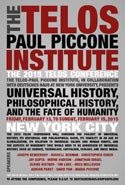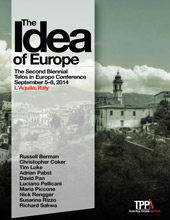By Agata Bielik-Robson · Thursday, June 18, 2015 The following paper was presented at the 2015 Telos Conference, held on February 13–15, 2015, in New York City. For additional details about the conference, please visit the Telos-Paul Piccone Institute website.
In my short essay, I would like to outline a new strategy of the universalization of history, which emerges from the analysis of modern Jewish practice of philosophizing. I call it a Marrano strategy, by building an analogy between the religious practices of the late-medieval Sephardic Jewry, which was forced to convert to Christianity but kept Judaism “undercover,” and the philosophical intervention of modern Jewish thinkers who spoke the seemingly universal idiom of Western philosophy but, at the same time, impregnated it “secretly” with motives deriving from their “particular” background.[1] Yet, they did not do it in order to abolish the universalist perspective, but to transform it; for the last heirs of this “Marrano” line, Walter Benjamin and Jacques Derrida, the proper universalism amounts to an after-Babel project of mending the broken whole from within, horizontally, without assuming the lofty position of a general meta-language, but through the effort of multi-linguality.
Continue reading →
By Arash Falasiri · Monday, March 23, 2015  In his Critique of Judgment, Kant explains how “subjective judgments” resemble theoretical claims about truth in that they claim universal assent, even though they do not have an objective basis for doing so. In other words, although they are subjective, they assert a strict sense of objectivity and claim a universal ground for truth. Therefore, the proof of the validity of these judgments cannot be found in a specific “observable feature” of the object, but rather in the “actual intersubjective agreement.” While truth in his third Critique is neither a matter of the intellect nor a thing reducible to conceptual realm, it seems that he offers a different sense of truth that influenced the major trends in continental philosophy. One can trace this sense of truth as it provides a ground not only to “test the limits of our historical era” but also “to go beyond them.” In his Critique of Judgment, Kant explains how “subjective judgments” resemble theoretical claims about truth in that they claim universal assent, even though they do not have an objective basis for doing so. In other words, although they are subjective, they assert a strict sense of objectivity and claim a universal ground for truth. Therefore, the proof of the validity of these judgments cannot be found in a specific “observable feature” of the object, but rather in the “actual intersubjective agreement.” While truth in his third Critique is neither a matter of the intellect nor a thing reducible to conceptual realm, it seems that he offers a different sense of truth that influenced the major trends in continental philosophy. One can trace this sense of truth as it provides a ground not only to “test the limits of our historical era” but also “to go beyond them.”
Continue reading →
By Eduardo Sabrovsky · Saturday, November 8, 2014  I thank very much the organizers for this opportunity to discuss “The Idea of Europe.” Among the several specific topics for discussion suggested in the conference outline, my paper will address the question: “Universalism or exceptionalism?” Now, in the context of this conference, this question might be understood either in historical-political or in philosophical terms, or somehow in both. And it is my contention that, in “the Idea of Europe” the historical-political and the philosophical as such substantially converge. In other words, in “the idea,” with its philosophical complexities, we should be able to find the trace of the decisive rupture in historical time—event, exception—that gave rise to modern Europe and conferred a particular direction, a primordial bias to its temporal unfolding; a bias not opposed to modern reason’s universalism, and inherently beyond the reach of its critical powers. I thank very much the organizers for this opportunity to discuss “The Idea of Europe.” Among the several specific topics for discussion suggested in the conference outline, my paper will address the question: “Universalism or exceptionalism?” Now, in the context of this conference, this question might be understood either in historical-political or in philosophical terms, or somehow in both. And it is my contention that, in “the Idea of Europe” the historical-political and the philosophical as such substantially converge. In other words, in “the idea,” with its philosophical complexities, we should be able to find the trace of the decisive rupture in historical time—event, exception—that gave rise to modern Europe and conferred a particular direction, a primordial bias to its temporal unfolding; a bias not opposed to modern reason’s universalism, and inherently beyond the reach of its critical powers.
Continue reading →
By Telos Press · Friday, November 7, 2014 In this video from the 2014 Telos in Europe Conference, Phillip Blond of ResPublica proposes that the future stability of representative democracy, particularly in Europe, depends upon a new understanding of universals that would provide the basis of the good.
Continue reading →
|
|
 In his Critique of Judgment, Kant explains how “subjective judgments” resemble theoretical claims about truth in that they claim universal assent, even though they do not have an objective basis for doing so. In other words, although they are subjective, they assert a strict sense of objectivity and claim a universal ground for truth. Therefore, the proof of the validity of these judgments cannot be found in a specific “observable feature” of the object, but rather in the “actual intersubjective agreement.” While truth in his third Critique is neither a matter of the intellect nor a thing reducible to conceptual realm, it seems that he offers a different sense of truth that influenced the major trends in continental philosophy. One can trace this sense of truth as it provides a ground not only to “test the limits of our historical era” but also “to go beyond them.”
In his Critique of Judgment, Kant explains how “subjective judgments” resemble theoretical claims about truth in that they claim universal assent, even though they do not have an objective basis for doing so. In other words, although they are subjective, they assert a strict sense of objectivity and claim a universal ground for truth. Therefore, the proof of the validity of these judgments cannot be found in a specific “observable feature” of the object, but rather in the “actual intersubjective agreement.” While truth in his third Critique is neither a matter of the intellect nor a thing reducible to conceptual realm, it seems that he offers a different sense of truth that influenced the major trends in continental philosophy. One can trace this sense of truth as it provides a ground not only to “test the limits of our historical era” but also “to go beyond them.”  I thank very much the organizers for this opportunity to discuss “The Idea of Europe.” Among the several specific topics for discussion suggested in the conference outline, my paper will address the question: “Universalism or exceptionalism?” Now, in the context of this conference, this question might be understood either in historical-political or in philosophical terms, or somehow in both. And it is my contention that, in “the Idea of Europe” the historical-political and the philosophical as such substantially converge. In other words, in “the idea,” with its philosophical complexities, we should be able to find the trace of the decisive rupture in historical time—event, exception—that gave rise to modern Europe and conferred a particular direction, a primordial bias to its temporal unfolding; a bias not opposed to modern reason’s universalism, and inherently beyond the reach of its critical powers.
I thank very much the organizers for this opportunity to discuss “The Idea of Europe.” Among the several specific topics for discussion suggested in the conference outline, my paper will address the question: “Universalism or exceptionalism?” Now, in the context of this conference, this question might be understood either in historical-political or in philosophical terms, or somehow in both. And it is my contention that, in “the Idea of Europe” the historical-political and the philosophical as such substantially converge. In other words, in “the idea,” with its philosophical complexities, we should be able to find the trace of the decisive rupture in historical time—event, exception—that gave rise to modern Europe and conferred a particular direction, a primordial bias to its temporal unfolding; a bias not opposed to modern reason’s universalism, and inherently beyond the reach of its critical powers. 

